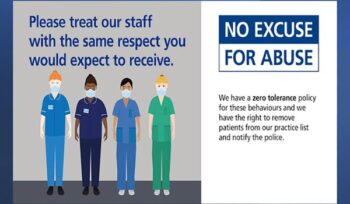Our medical office is committed to providing a safe, respectful, and professional environment for our patients, visitors, and staff. While we strive to deliver compassionate care, we also recognize that our team has the right to work free from abuse, threats, and intimidation. This policy establishes a zero tolerance stance on aggressive behavior directed toward our staff or … [Read more...] about Sample Policy: Zero Tolerance Policy for Aggressive Behavior
Compliance
What Your Parking Lot Says About Your Practice—and Why It Matters More Than You Think
Before a patient ever checks in at the front desk or sees a provider, they’ve already had their first experience with your practice—and it starts in the parking lot. Whether they’re struggling to find a spot, dodging potholes, or wondering which entrance to use, that brief moment of uncertainty or frustration can set the tone for the entire visit. In a busy medical office, … [Read more...] about What Your Parking Lot Says About Your Practice—and Why It Matters More Than You Think
🌟 Small Medical Office Manager Cheat Sheet
Because managing and doing the work is a whole job — and then some. Running a small medical office often means wearing all the hats: front desk support, team leader, patient scheduler, supply wrangler, and occasional IT hero. This cheat sheet is designed to keep you steady amid the swirl — giving you quick structure, smart shortcuts, and sanity-saving systems to manage your … [Read more...] about 🌟 Small Medical Office Manager Cheat Sheet
AI in medical office management: Leveraging technology for enhanced efficiency
In the ever-evolving landscape of healthcare, medical office managers find themselves at the forefront of integrating innovative technologies to streamline operations, improve patient care, and optimize administrative workflows. Among these advancements, Artificial Intelligence (AI) stands out as a transformative tool that is already playing a significant role in various … [Read more...] about AI in medical office management: Leveraging technology for enhanced efficiency
Using patient portals to enhance communication and engagement
In today’s digital age, enhancing communication and engagement with your patients is more important than ever. One of the most effective tools at your disposal is the patient portal. This online platform can transform how you interact with patients, making communication more efficient and fostering a deeper level of engagement. Let’s explore how you can utilize patient portals … [Read more...] about Using patient portals to enhance communication and engagement
Do I Fire A Staffer Who Doesn’t Deserve It?
By Lynne Curry Question: When our newly hired general manager pulled me into his office this morning, he asked me to fire a staff member, an individual I know well and who’s always impressed me as a hard worker. I run our company’s HR department. I asked, “Could you give me the details, so I can create a solid case for our file?” The GM, a fifty-something white man … [Read more...] about Do I Fire A Staffer Who Doesn’t Deserve It?
Why and How to Provide Translators for Patients
One critical area that can often be overlooked in a medical office is the need for translation services. For many patients with limited English proficiency (LEP), the ability to communicate effectively with healthcare providers can be a matter of safety, health, and trust. Providing accessible language services is not just a nice-to-have — it’s essential for your practice’s … [Read more...] about Why and How to Provide Translators for Patients
HIPAA Compliance Updates for Medical Office Managers
As of April 2025, several significant updates to the Health Insurance Portability and Accountability Act (HIPAA) have been introduced, impacting medical office operations. These changes aim to enhance patient privacy, bolster cybersecurity, and improve data interoperability. Below is a summary of the key updates: Enhanced Protections for Reproductive Health … [Read more...] about HIPAA Compliance Updates for Medical Office Managers
Cheat Sheet for the Manager of a Small Medical Office
Managing a small medical office means juggling a wide range of responsibilities, from keeping daily operations running smoothly to staying on top of billing, compliance, and patient satisfaction. This cheat sheet is designed to help you stay organized, prioritize your workload, and make sure nothing falls through the cracks. Whether you're opening the office for the day or … [Read more...] about Cheat Sheet for the Manager of a Small Medical Office
Daily Opening and Closing Checklist for Medical Offices
Introduction Running a smooth and professional medical practice starts and ends with a consistent routine. This Daily Opening and Closing Checklist helps ensure your office is fully prepared to welcome patients in the morning and properly secured at the end of the day. By following these steps, you reduce the chances of overlooked tasks, maintain HIPAA compliance, and create a … [Read more...] about Daily Opening and Closing Checklist for Medical Offices









